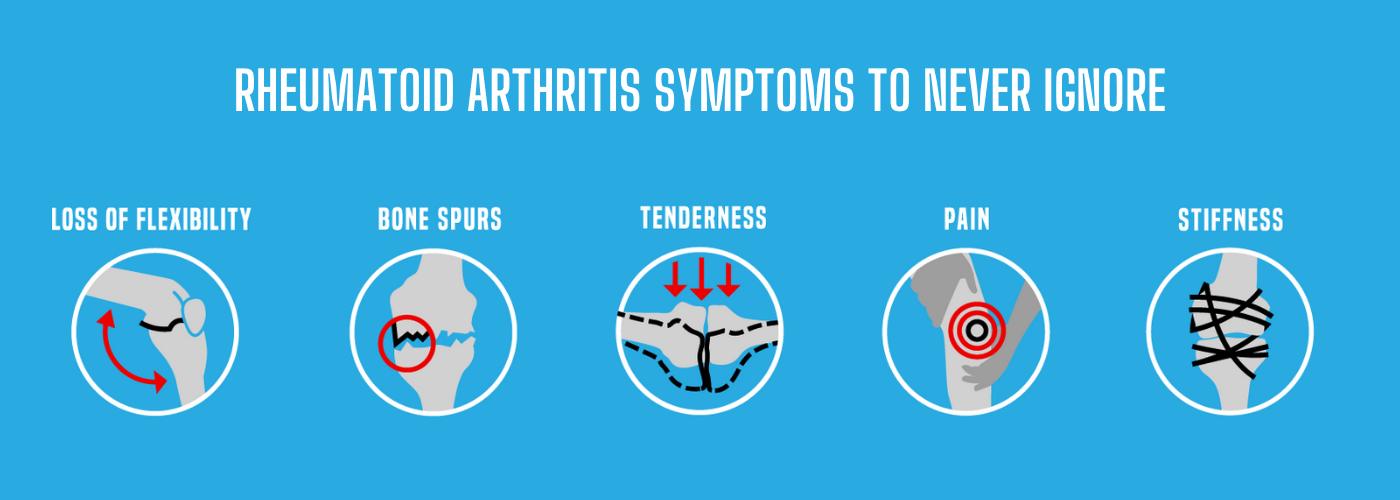Arthritis is a chronic condition that affects millions of people in the United States, causing pain and stiffness in joints throughout the body. It can be a debilitating condition, often making everyday tasks difficult to complete. While there are many types of arthritis, common warning signs can be found among them. Knowing the warning signs of arthritis can help you take proactive steps toward managing your condition.
Arthritis Symptoms

Arthritis is characterized by joint inflammation, leading to pain, stiffness, and limited mobility. The symptoms of arthritis can vary depending on the type and severity of the condition.
One of the most common symptoms of arthritis is joint pain. This pain can be mild or severe and may be felt throughout the body or in specific areas such as the knees, hips, fingers, or spine. The pain may be constant or come and go throughout the day.
Another symptom of arthritis is stiffness in the joints. This stiffness can make it difficult to move certain body parts, especially after rest periods.
You may also experience swelling around your joints due to inflammation caused by arthritis. In some cases, this swelling may cause visible deformities in affected joints over time if left untreated.
What Helps With Arthritis?

While many treatments are available for arthritis, not all of them are effective for everyone. One treatment option that has shown promise in relieving arthritis symptoms is the use of TENS devices.
TENS stands for Transcutaneous Electrical Nerve Stimulation. These devices use electrical impulses to stimulate nerves in the affected area, which may help reduce pain and inflammation.
TENS machines come in different shapes and sizes and can be used at home or by a healthcare professional.
One benefit of using a TENS device for arthritis is that it may provide targeted relief to specific areas of the body where the pain is most severe.
By targeting damaged areas with stim therapy, new blood flow can enter the damaged tissue, which may help recovery. This may lessen the overall discomfort and pain associated with arthritis.
What Vitamins Are Good For Arthritis?

While there are many different treatments available for arthritis, taking vitamins can be a naturally effective way to reduce symptoms and improve overall health.
Vitamin D is one of the most important vitamins for people with arthritis. This vitamin helps maintain strong bones and muscles, which can help reduce joint pain and stiffness. Vitamin D also plays a role in regulating the immune system, which may help reduce joint inflammation.
Foods rich in vitamin D include fatty fish like salmon, tuna, and mackerel, as well as egg yolks and fortified dairy products.
Another important vitamin for arthritis sufferers is vitamin C. This powerful antioxidant helps protect cells from damage caused by free radicals and may help prevent cartilage breakdown in the joints.
Vitamin C is found in oranges, kiwis, strawberries, and other fruits and vegetables. The recommended daily amount of vitamin C for adults is 90 mg.
In addition to vitamin C, magnesium is an important mineral that works with calcium to help keep the body healthy and strong.
Magnesium may help reduce joint pain by reducing the release of histamine and other inflammatory substances. Magnesium is found in leafy green vegetables such as spinach, as well as nuts and whole grains.
Choosing a diet that’s nutrient dense is one of the best ways to lead a healthy lifestyle and decrease factors like heart disease and conditions like arthritis.
Can Cracking Knuckles Cause Arthritis?
Many people have wondered whether the habit of cracking knuckles can lead to arthritis later in life, and it’s a topic that experts have debated for decades.
On one hand, some believe that the act of cracking knuckles can cause damage to the joints over time, leading to inflammation and an increased risk of developing arthritis.
So, does cracking knuckles cause arthritis? The answer is no.
Despite the common belief that cracking your knuckles can lead to arthritis, there is no scientific evidence to support this claim. Several studies have been conducted over the years and none of them have found a link between knuckle cracking and arthritis.
It is important to note that while cracking your knuckles may not cause arthritis, it can still be harmful in other ways. Repeatedly popping your joints can temporarily reduce grip strength, swelling, and pain.
In conclusion, if you’re worried about whether or not you should crack your knuckles – don’t be. There is no evidence that it leads to arthritis or other serious health problems.

Related Stories
How to Cope with a Sports Injury
Staying active helps your body stay strong. But sometimes, activity leads to pain, strain, or...
Jul
Red, White, and Soothe: How HiDow Helps You Recover in the Heat
Recovery that works in winter doesn’t always hold up in the heat. The body reacts...
Jul
Massage Gun Showdown: How the Power Duo Compares to Traditional Methods
Have you ever considered that a handheld device could revolutionize your muscle recovery? With the...
Jun
Fatherly Fitness Tips For Men’s Health Month
Men’s Health Month is more than a date on the calendar—it’s a call to action....
Jun
Built to Move: The Everyday Recovery Edit
Movement is what keeps us going—literally. Whether it’s recovering after a run, loosening up after...
Jun
Unlocking The Secret To Tissue Injury Recovery With TENS/EMS Devices
Have you ever wondered why some injuries take longer to heal than others? Tissue injuries...
May